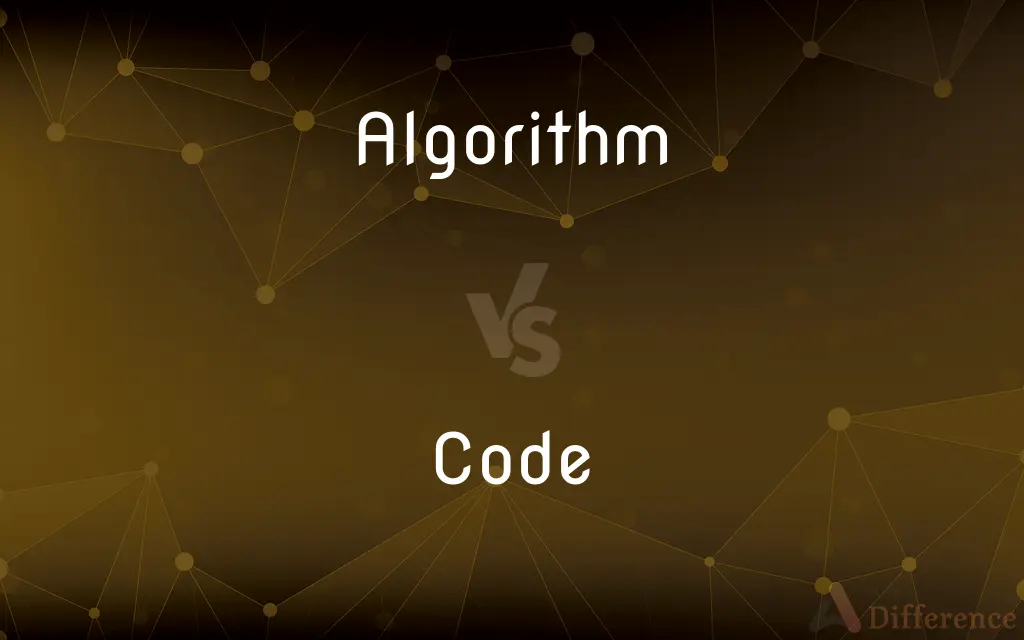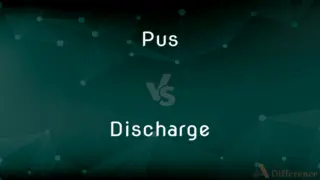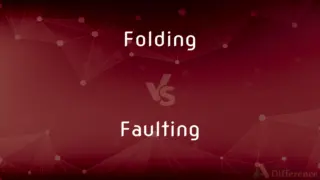Algorithm vs. Code — What's the Difference?
By Fiza Rafique & Maham Liaqat — Updated on March 21, 2024
An algorithm is a step-by-step procedure for solving a problem or performing a task, while code is the implementation of an algorithm in a programming language.

Difference Between Algorithm and Code
Table of Contents
ADVERTISEMENT
Key Differences
An algorithm outlines a series of steps to solve a problem or perform a computation, focusing on the logic and order of operations. It is a conceptual framework that can be understood without any programming knowledge. On the other hand, code is the tangible expression of an algorithm in a specific programming language, making the algorithm executable by a computer.
While an algorithm can be expressed in natural language or pseudocode and remains the same across different programming languages, code is written in a specific syntax and varies depending on the programming language used. Thus, the same algorithm can lead to different code implementations in Python, Java, or C++.
Algorithms are designed to be efficient and effective, focusing on the optimization of resources like time and memory. In contrast, code also considers readability, maintainability, and adherence to coding standards specific to the programming language, which can affect its structure beyond the algorithm’s requirements.
The creation of an algorithm is the first step in developing a software solution, emphasizing problem-solving and logical structuring. Coding, however, is the act of translating this solution into a programmable format, which also involves debugging, testing, and optimization based on the programming environment.
Algorithms are often discussed in terms of their theoretical performance, using concepts like Big O notation to describe their efficiency. Code, meanwhile, is evaluated based on its real-world performance, including speed, memory usage, and scalability in specific hardware and software environments.
ADVERTISEMENT
Comparison Chart
Definition
A step-by-step procedure to solve a problem.
The implementation of an algorithm in a programming language.
Nature
Conceptual and language-independent.
Practical and language-specific.
Purpose
To outline the logic for solving a problem.
To execute the algorithm on a computer.
Expression
Can be described in natural language or pseudocode.
Written in specific programming languages.
Focus
Efficiency and problem-solving strategy.
Readability, maintainability, and performance.
Performance Metric
Theoretical efficiency (e.g., Big O notation).
Real-world performance (speed, memory usage).
Creation Stage
Initial step in the development process.
Follows algorithm design; involves debugging and testing.
Compare with Definitions
Algorithm
A set of rules or steps to solve a problem.
Dijkstra’s algorithm finds the shortest path between nodes in a graph.
Code
The syntax and statements in a programming language.
Python code for a Hello, World! program is print(Hello, World!).
Algorithm
A procedure for performing a calculation.
The Euclidean algorithm calculates the greatest common divisor of two numbers.
Code
A script or program written to execute a task.
JavaScript code to change a webpage’s background color.
Algorithm
A method for processing data.
The Bubble Sort algorithm sorts elements in ascending order.
Code
A set of commands to create functionalities.
SQL code to query a database.
Algorithm
A pattern for organizing information.
Binary search algorithm efficiently locates an item in a sorted list.
Code
Instructions that a computer can understand and execute.
Assembly code for adding two numbers.
Algorithm
A formula for solving a mathematical problem.
The Fibonacci sequence algorithm generates a series of numbers where each number is the sum of the two preceding ones.
Code
The implementation of algorithms in software.
Java code implementing the QuickSort algorithm.
Algorithm
In mathematics and computer science, an algorithm ( (listen)) is a finite sequence of well-defined, computer-implementable instructions, typically to solve a class of specific problems or to perform a computation. Algorithms are always unambiguous and are used as specifications for performing calculations, data processing, automated reasoning, and other tasks.
Code
In communications and information processing, code is a system of rules to convert information—such as a letter, word, sound, image, or gesture—into another form, sometimes shortened or secret, for communication through a communication channel or storage in a storage medium. An early example is an invention of language, which enabled a person, through speech, to communicate what they thought, saw, heard, or felt to others.
Algorithm
A finite set of unambiguous instructions that, given some set of initial conditions, can be performed in a prescribed sequence to achieve a certain goal and that has a recognizable set of end conditions.
Code
A system of words, letters, figures, or symbols used to represent others, especially for the purposes of secrecy
The Americans cracked their diplomatic code
Messages written in code
Algorithm
(countable) A collection of ordered steps that solve a mathematical problem. A precise step-by-step plan for a computational procedure that possibly begins with an input value and yields an output value in a finite number of steps.
Code
Program instructions
Assembly code
Algorithm
Calculation with Arabic numerals; algorism.
Code
A systematic collection of laws or statutes
A revision of the penal code
Algorithm
A precise rule (or set of rules) specifying how to solve some problem; a set of procedures guaranteed to find the solution to a problem.
Code
Convert (the words of a message) into a code so as to convey a secret meaning
Only Mitch knew how to read the message—even the name was coded
Algorithm
A precise rule (or set of rules) specifying how to solve some problem
Code
Write code for (a computer program)
Most developers code C + + like C
I no longer actively code in PHP
Code
Be the genetic code for (an amino acid or protein)
Genes that code for human growth hormone
Code
A system of signals used to represent letters or numbers in transmitting messages.
Code
A system of symbols, letters, or words given certain arbitrary meanings, used for transmitting messages requiring secrecy or brevity.
Code
An access code.
Code
A special command, such as a sequence of keystrokes, that allows a user to activate a hidden or accidental feature in a computer program or video game.
Code
The information that constitutes a specific computer program.
Code
A system of symbols and rules that serve as instructions for a computer.
Code
(Genetics) The genetic code.
Code
A systematically arranged and comprehensive collection of laws.
Code
A systematic collection of regulations or rules of procedure or conduct
A building code.
Code
(Medicine) Code blue.
Code
(Slang) A patient whose heart has stopped beating, as in cardiac arrest.
Code
To convert (a message, for example) into code.
Code
To systematize and arrange (laws and regulations) into a code.
Code
To assign a code to (something) for identification or classification
Coded each response to the survey by age and gender.
Code
To specify the genetic code for an amino acid or a polypeptide
A gene that codes for an enzyme.
Code
To specify the genetic code for a trait or characteristic
A gene that codes for red hair.
Code
(Computers) To write or revise a computer program.
Code
(Slang) To go into cardiac arrest.
Code
A short symbol, often with little relation to the item it represents.
This flavour of soup has been assigned the code WRT-9.
Code
A body of law, sanctioned by legislation, in which the rules of law to be specifically applied by the courts are set forth in systematic form; a compilation of laws by public authority; a digest.
Code
Any system of principles, rules or regulations relating to one subject.
The medical code is a system of rules for the regulation of the professional conduct of physicians.
The naval code is a system of rules for making communications at sea by means of signals.
Code
A set of rules for converting information into another form or representation.
Code
By synecdoche: a codeword, code point, an encoded representation of a character, symbol, or other entity.
The ASCII code of "A" is 65.
Code
A message represented by rules intended to conceal its meaning.
Code
(cryptography) A cryptographic system using a codebook that converts words or phrases into codewords.
Code
Instructions for a computer, written in a programming language; the input of a translator, an interpreter or a browser, namely: source code, machine code, bytecode.
Object-oriented C++ code is easier to understand for a human than C code.
I wrote some code to reformat text documents.
This HTML code may be placed on your web page.
Code
(scientific programming) A program.
Code
(linguistics) A particular lect or language variety.
Code
(medicine) An emergency requiring situation-trained members of the staff.
Code
(informal) A set of unwritten rules that bind a social group.
Girl code
Code
(computing) To write software programs.
I learned to code on an early home computer in the 1980s.
Code
To add codes to a dataset.
Code
To categorise by assigning identifiers from a schedule, for example CPT coding for medical insurance purposes.
Code
(cryptography) To encode.
We should code the messages we send out on Usenet.
Code
To encode a protein.
Code
(medicine) To call a hospital emergency code.
Coding in the CT scanner
Code
To go into a state where a hospital emergency code is required to save one's life.
He coded out of nowhere
Code
(medicine) Of a patient, to suffer a sudden medical emergency a code blue such as cardiac arrest.
Code
A body of law, sanctioned by legislation, in which the rules of law to be specifically applied by the courts are set forth in systematic form; a compilation of laws by public authority; a digest.
Code
Any system of rules or regulations relating to one subject; as, the medical code, a system of rules for the regulation of the professional conduct of physicians; the naval code, a system of rules for making communications at sea means of signals.
Code
A set of rules or principles or laws (especially written ones)
Code
A coding system used for transmitting messages requiring brevity or secrecy
Code
(computer science) the symbolic arrangement of data or instructions in a computer program or the set of such instructions
Code
Attach a code to;
Code the pieces with numbers so that you can identify them later
Code
Convert ordinary language into code;
We should encode the message for security reasons
Common Curiosities
Can an algorithm be written in any programming language?
Yes, an algorithm can be implemented (coded) in any programming language, though the algorithm itself is language-independent.
Is pseudocode the same as code?
No, pseudocode is a simplified, language-agnostic description of an algorithm, used to plan the code, which is written in a specific programming language.
Can the same algorithm have different code implementations?
Yes, the same algorithm can be implemented differently in code, varying by programming language, coding style, and optimization techniques.
Can an efficient algorithm reduce the need for powerful hardware?
Yes, efficient algorithms can optimize resource use, potentially reducing the need for more powerful hardware to achieve desired performance.
What role does coding standards play in coding?
Coding standards ensure consistency, readability, and quality in code, facilitating maintenance and collaboration among developers.
Why is understanding algorithms important for coding?
Understanding algorithms helps in devising efficient solutions to problems, which can then be coded effectively in a programming language.
How do algorithms affect software performance?
The choice and design of algorithms directly impact the efficiency, speed, and resource use of software, determining its overall performance.
What is the difference between an algorithm and code?
An algorithm is a conceptual, step-by-step procedure for solving a problem, while code is the practical implementation of an algorithm in a specific programming language.
Why might an algorithm be changed after initial coding?
An algorithm might be changed to improve efficiency, address unforeseen problems, or adapt to new requirements or data structures.
What is the importance of code readability?
Code readability makes it easier for other programmers to understand, maintain, and debug the code, contributing to better software quality.
How can an algorithm be optimized?
An algorithm can be optimized by refining its steps to reduce resource usage, improving its efficiency, or adapting it to specific problem constraints.
Do all software applications use algorithms?
Yes, all software applications use algorithms to process data, perform calculations, and solve problems, though the complexity varies.
What is an example of a real-world problem solved by an algorithm?
Routing algorithms in GPS navigation systems solve the problem of finding the shortest or fastest path from one location to another.
Is it possible to code without understanding algorithms?
While basic coding can be done without deep algorithmic knowledge, solving complex problems and optimizing software performance requires understanding algorithms.
How do developers choose which programming language to use for coding an algorithm?
The choice often depends on the application’s requirements, performance needs, developer expertise, and the specific features or libraries of the programming language.
Share Your Discovery

Previous Comparison
Pus vs. Discharge
Next Comparison
Folding vs. FaultingAuthor Spotlight
Written by
Fiza RafiqueFiza Rafique is a skilled content writer at AskDifference.com, where she meticulously refines and enhances written pieces. Drawing from her vast editorial expertise, Fiza ensures clarity, accuracy, and precision in every article. Passionate about language, she continually seeks to elevate the quality of content for readers worldwide.
Co-written by
Maham Liaqat














































